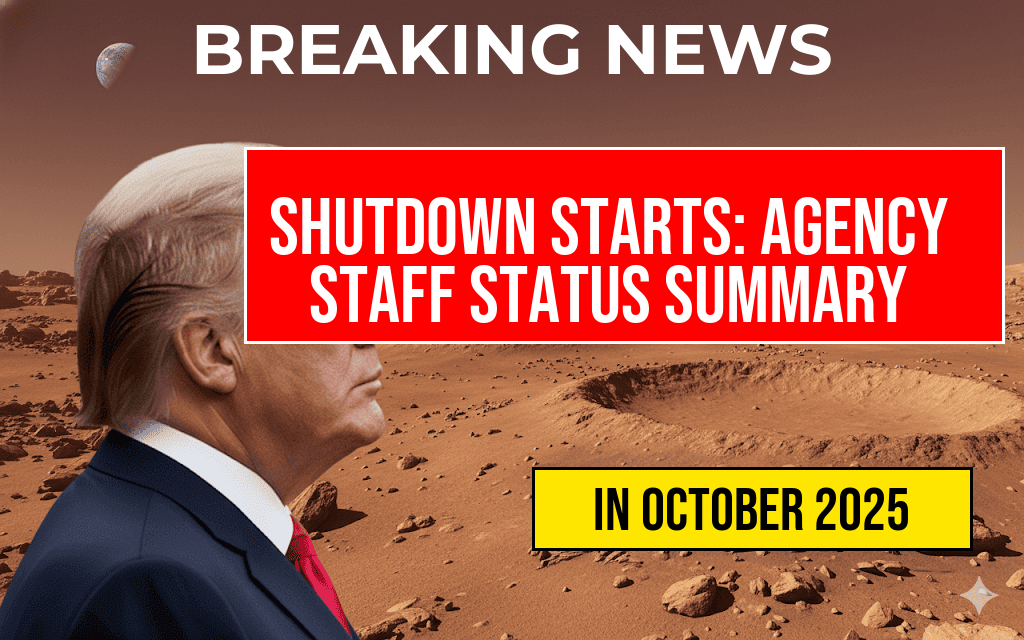The federal government has officially entered a shutdown after negotiations over funding failed to reach an agreement before the deadline. Thousands of federal employees face furloughs or work without pay as numerous agencies halt non-essential operations. The shutdown affects a broad spectrum of departments, including critical services like Social Security, the Internal Revenue Service (IRS), the Department of Defense, and the Transportation Security Administration (TSA). While some agencies maintain limited staffing to ensure essential functions continue, many programs and services are temporarily suspended or operate with significantly reduced personnel. This development marks a significant shift in government operations, with implications for millions of Americans reliant on federal services and benefits. Here is a comprehensive agency-by-agency breakdown of staffing status and operational impacts amid the shutdown.
Overview of Federal Agency Staffing During Shutdown
| Agency | Staffed (Essential & Non-Essential) | Unstaffed (Furloughed or Suspended) |
|---|---|---|
| Social Security Administration | Operational with limited staff on-site for critical functions | Most services suspended; claims processing slowed |
| Internal Revenue Service (IRS) | Limited staff for core taxpayer services | Processing of refunds and audits halted |
| Department of Defense | Essential personnel including military operations continue | Many administrative and civilian services paused |
| Transportation Security Administration (TSA) | Staffing remains steady at airports for security screening | Non-security administrative functions halted |
| Environmental Protection Agency (EPA) | Most critical environmental monitoring maintained | Research and enforcement activities suspended |
| Department of Education | Limited staff for student aid processing | Most programs and offices closed |
Critical Services Continue Amid Staffing Reductions
Social Security Administration
Despite the shutdown, Social Security offices are operating with reduced staffing, primarily focusing on processing payments and essential inquiries. Many local offices have limited hours or are temporarily closed, leading to delays for beneficiaries seeking in-person assistance. However, online services and phone support are still available, though response times may be longer than usual. The agency has assured the public that current benefit payments will proceed as scheduled, but new applications or complex issues could face delays.
Internal Revenue Service (IRS)
The IRS continues limited operations to process tax refunds and handle urgent taxpayer issues. However, most routine services, including audit processing and customer support, are suspended. Tax deadlines remain unchanged, but taxpayers are encouraged to plan accordingly, as some correspondence or refund processing may experience delays. The IRS has warned that some notices and refunds could be delayed due to staffing constraints.
Department of Defense
As the largest federal employer, the Department of Defense maintains a core military presence, including active-duty personnel and essential civilian staff supporting national security. Most administrative functions, training exercises, and non-essential operations are halted during the shutdown. Defense contractors and support services face uncertainty, with many furloughed or working without pay until funding is restored.
Transportation Security Administration (TSA)
Unlike many agencies, the TSA has managed to keep airport security screening operational by maintaining staffing levels necessary for national security. TSA officers continue working to ensure passenger safety, although some administrative functions, background checks, and recruitment efforts are paused. Travelers are advised to expect longer lines at airports due to staffing limitations in support roles.
Impacts on Other Agencies and Services
Environmental Protection Agency (EPA)
The EPA has scaled back most enforcement and research activities, focusing solely on critical environmental monitoring. Projects related to climate change, pollution control, and enforcement of environmental laws are put on hold, risking delays in regulatory activities and compliance inspections.
Department of Education
Most Department of Education functions, including processing student loans and grants, are suspended. Only the most urgent support for students in disaster-affected areas continues. The shutdown could disrupt upcoming loan disbursements and impact ongoing educational initiatives.
Other Notable Agencies
- Federal Emergency Management Agency (FEMA): Continues to support disaster response efforts with essential staff.
- U.S. Postal Service: Operates as usual, independent of federal funding, but security and administrative functions see some delays.
- National Institutes of Health (NIH): Most research activities are paused, with only critical health functions maintained.
Public and Economic Implications
The government shutdown’s ripple effects extend beyond federal offices. Federal contractors face uncertainty, and many employees are furloughed without pay, reducing consumer spending and impacting local economies. Americans relying on federal benefits, such as Social Security recipients, may experience delays or disruptions, though payments are generally safeguarded during short-term shutdowns. The uncertainty also weighs on financial markets, with analysts monitoring the potential long-term consequences for economic stability.
Looking Ahead
Negotiations continue among lawmakers to resolve funding disagreements and reopen the government. The shutdown underscores ongoing political divisions over federal spending priorities, with many agencies preparing for a potentially prolonged impasse. Citizens and federal employees alike await further developments, hoping for a swift resolution to restore full agency operations.
For updates on specific agency services and assistance, visit USA.gov or consult official agency websites.
Frequently Asked Questions
What departments are affected by the government shutdown?
The government shutdown impacts several agencies, including Social Security, IRS, Defense, and TSA. Some departments will have staffed personnel, while others may be unstaffed.
How does a government shutdown affect Social Security services?
During a shutdown, Social Security offices may operate with reduced staff, potentially causing delays in benefit processing and customer service. However, benefit payments typically continue as usual.
Will the IRS continue to process tax returns during the shutdown?
During a government shutdown, many IRS functions may be limited or paused, which can delay tax processing and refunds. Essential services related to tax collection may continue, but non-essential activities might be postponed.
Are TSA security operations affected by the shutdown?
TSA screening personnel are generally considered essential staff and are expected to continue operations during the shutdown, maintaining airport security. However, some support services may experience disruptions.
What should the public expect in terms of government services during the shutdown?
The public can expect limited government services, with many agencies operating with reduced staff or closing non-essential offices. It is advisable to check with specific agencies for updates on service availability.






